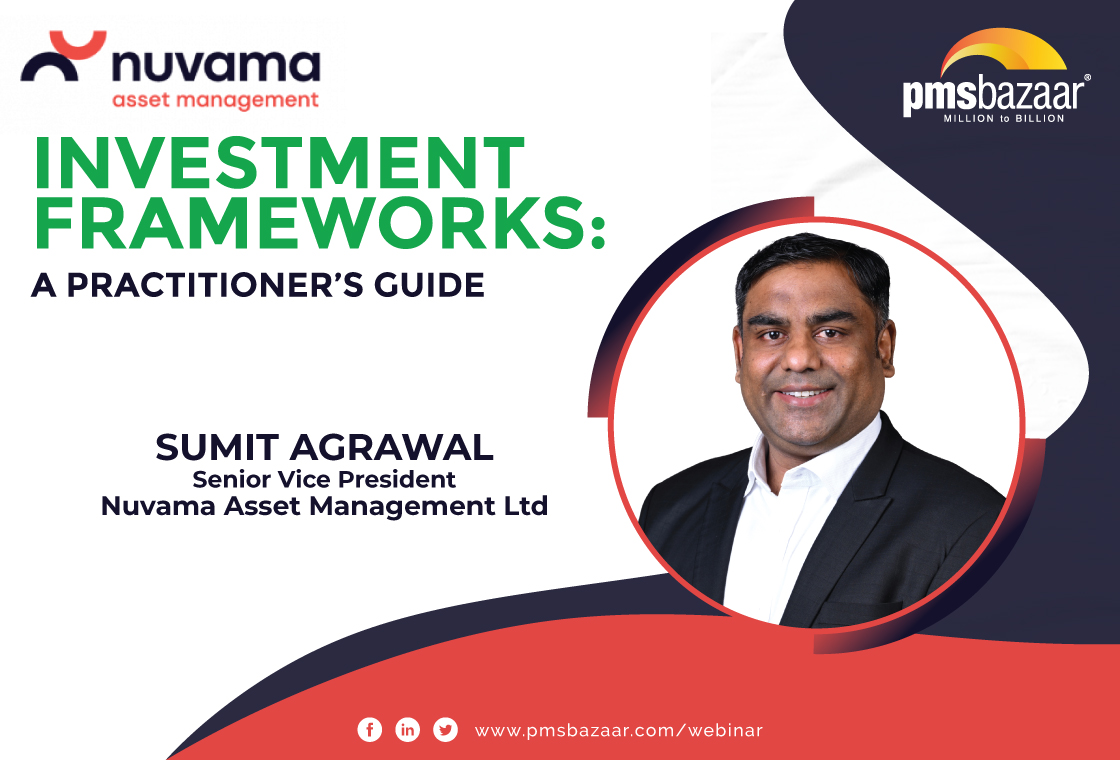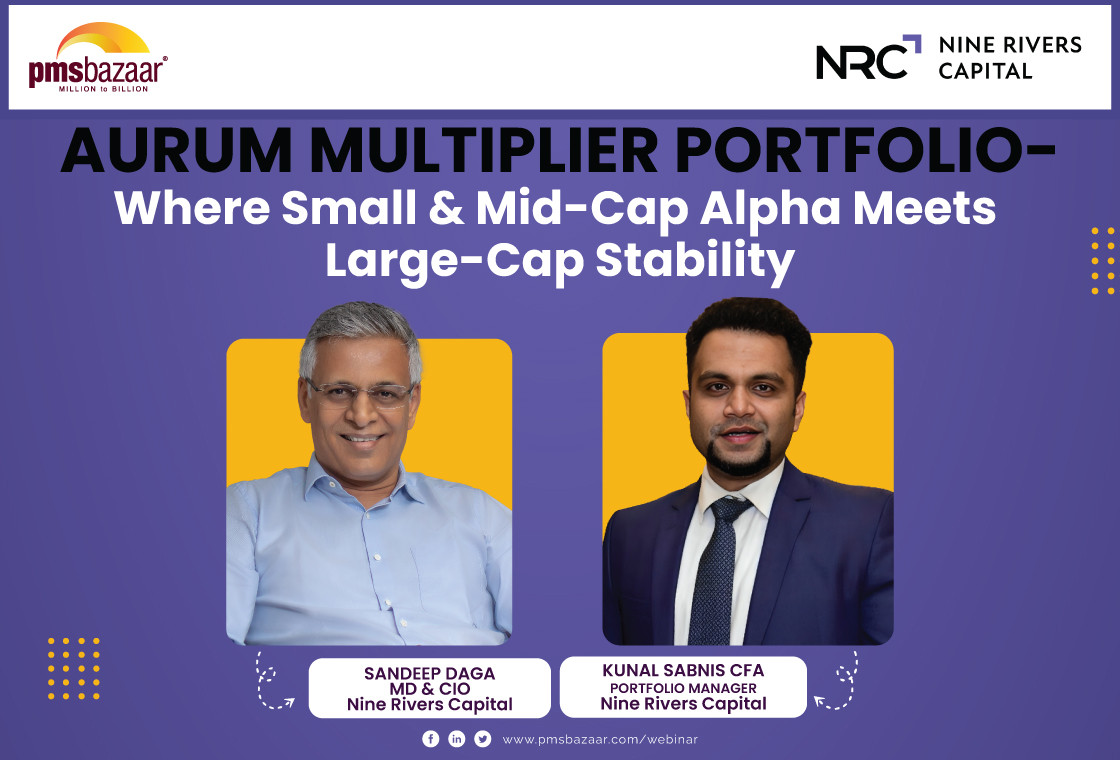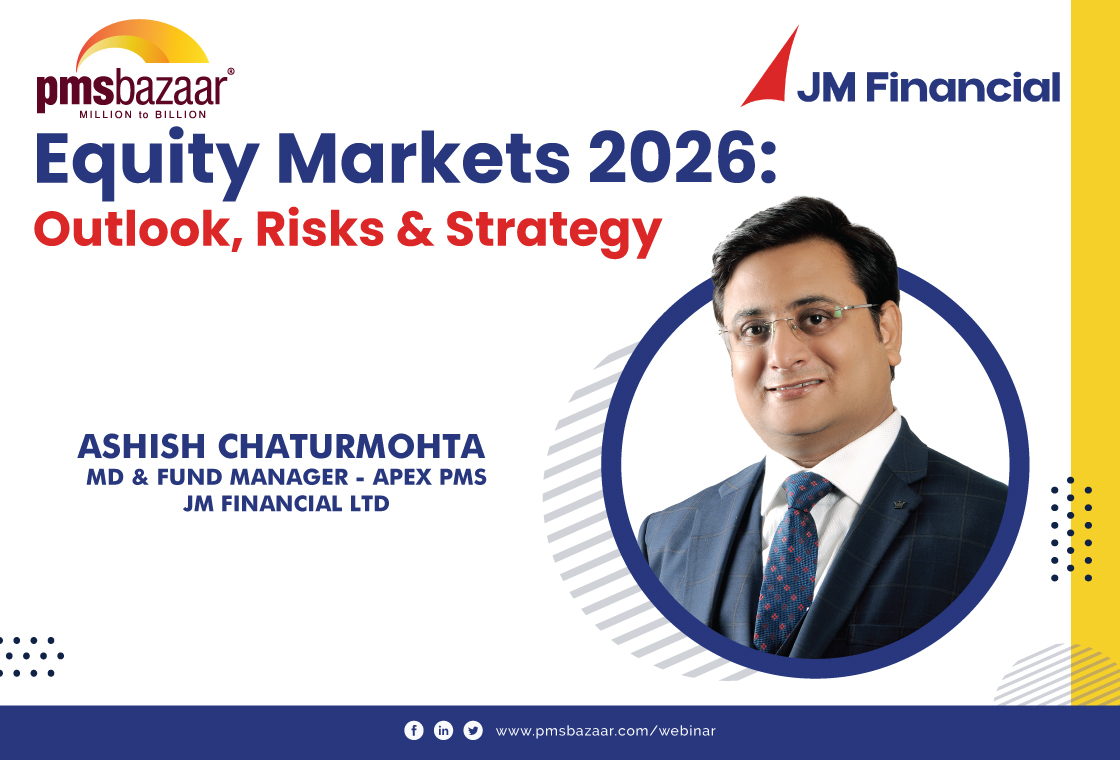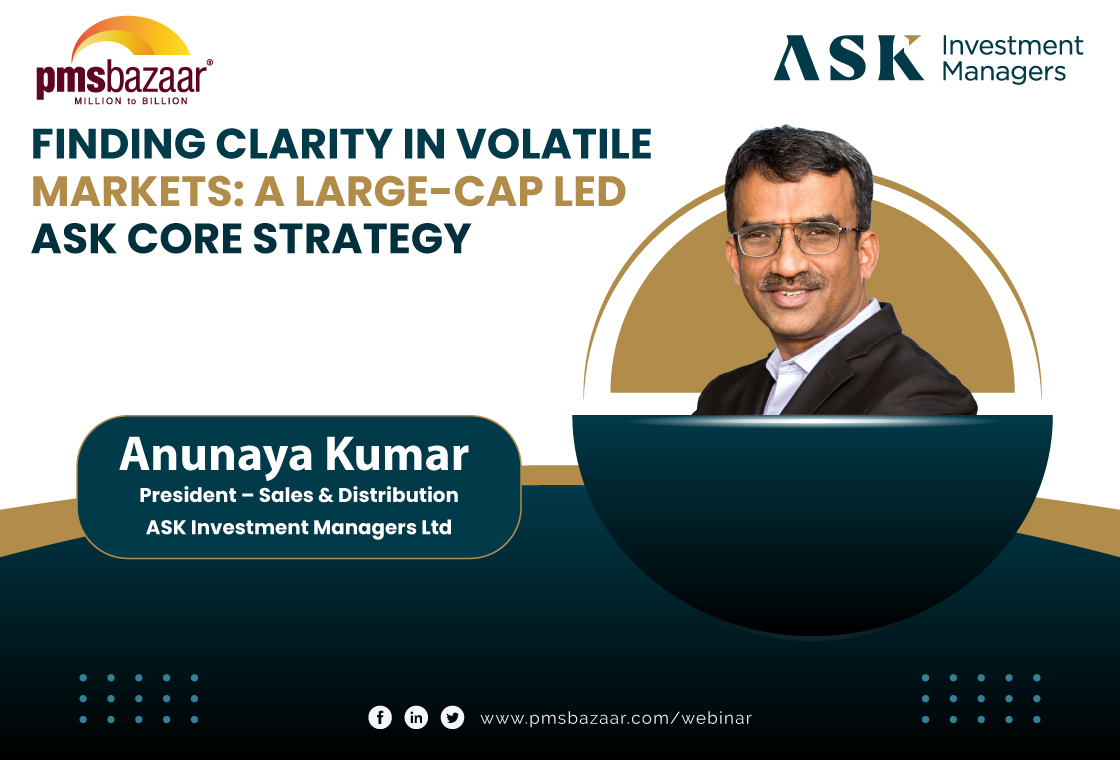A recent PMS Bazaar webinar explored Quant-based investments in India. Presented by Siddharth Vora of Prabhudas Lilladher, this session covered topics including - how quant investing works, the benefits of quant investing, Growing popularity of Quant Funds in India. Vora also briefed Prabhudas Lilladher's AQUA PMS Investment approach in detail.

Key pointers covered in this webinar blog are:
- Growing popularity of Quant Investing
- AQUA PMS Strategy: An Overview
- Frameworks & Key principles of AQUA PMS
- Machine Learning in the Investment Process
- The growing popularity of quant investing
Global shift to quantitative investing:
Quantitative investing involves the use of mathematical models, algorithms, and data analysis to make investment decisions. This approach has gained significant traction globally as investors seek more systematic and data-driven methods to navigate financial markets. Factors such as increased data availability, technological advancements, and the desire for a more disciplined and objective investment process have contributed to the rise of quantitative strategies.
Insights into the growth of quantitative funds in India:
Despite starting from a relatively small base, Vora provides insights into the increasing popularity of quantitative funds in the Indian market. Investors and fund managers are recognizing the potential benefits of quantitative strategies, including the ability to analyse vast datasets, identify patterns, and make investment decisions based on objective criteria. This shift indicates a changing mindset within the Indian investment community, moving towards more systematic and technology-driven approaches.
To start with, Vora emphasizes the importance of adaptability in the ever-changing market landscape. Aqua thrives on its ability to change. The strategy's success lies in its capability to respond and adapt to market changes, ensuring a robust and flexible approach to investing.
A transformative shift in the investment landscape:
The use of the term "transformative shift" underscores the magnitude and impact of the changes occurring in the traditional investment landscape in India. The rise of quantitative funds represents a departure from more traditional, discretionary methods of investing, signalling a broader industry evolution towards more sophisticated and technology-driven approaches.
Clear trend despite a small base:
Vora emphasizes that despite the initial size of the quantitative funds market in India, there is a clear and discernible trend towards its growth. This indicates that investors are increasingly recognising the potential advantages of quantitative strategies, and Aqua positions itself to cater to this emerging demand.
AQUA PMS Strategy: An overview
AQUA: Launch and strategy:
Vora introduced the Aqua Fund, launched in June 2023. The open-ended, flexi-cap, long-only equity PMS focuses on a diversified market cap approach and aims to generate alpha through its adaptive and multi-dimensional strategy.
Decoding quantitative investing through AQUA:
Vora breaks down Aqua's quantitative investing approach into five simple steps:
- Input Layer: Gathering, cleaning, and organizing raw data from reputable sources.
- Transformation Process: Building proprietary factors covering fundamental, technical, and regime aspects.
- Analytics Layer: Using objective rules and indicators to analyze market conditions, sentiments, and risk.
- Output Layer: Generating a portfolio based on asset allocation, style selection, sector focus, and timing.
- Performance Objective: Focusing on sustainable alpha generation and transparent attribution.
- Investment philosophy: Responsiveness over predictions.
The investment philosophy of Aqua revolves around responsiveness rather than predictions. Vora emphasizes the four key aspects of responsiveness: rebalancing the portfolio, relying on rules-based and objective systems, avoiding biases, and striving to improve returns or reduce risk based on market conditions.
Frameworks and key principles of AQUA PMS
The five key principles of AQUA:
Vora delves into the five key principles guiding Aqua's approach:
- Systematic Design: Strategies are systematically designed to ensure consistency.
- Measurable Performance: Performance is measured across market cycles for reliability.
- Adaptive Models: Aqua's models are adaptive to changing market conditions.
- Repeatable Alpha: The generated alpha is sustainable and repeatable.
- Transparent Attribution: The strategy provides transparent attribution to its performance.
Pillars driving AQUA’s performance:
In the final sections, Vora discusses the key pillars driving Aqua's performance. These include:
Equal-weighted approach: The strategy aims to avoid biases towards individual securities by adopting an equal-weighted approach. This is intended to generate granular returns rather than concentrated ones.
Responsive rotation: The portfolio undergoes rebalancing every two months to stay relevant and aligned with market realities. This responsive rotation involves adjusting the portfolio based on a success framework.
Success Framework (6S)
- Sector Rotation: Involves selecting and rotating sectors strategically.
- Style Alignment: Considers factors like style, fundamentals, valuation, and technical strength.
- Stock Selection: Evaluating stocks based on superior fundamentals including quality, growth and red flag metrics against peers
- Sound Valuation: Uses a 360-degree fundamental and technical valuation framework, to identify stocks trading at relatively cheaper multiples vs their peers, past and broader markets
- Strong Technicals: Based on technical indicators to identify stocks with relatively favourable technical risk reward by evaluating their demand-supply dynamics in terms of trend, volatility, and sentiment analytics
- Smart risk management: Optimal diversification and dynamically rebalance portfolio for asset allocation, and smart beta management to navigate market risks
Machine learning in the investment process
Alpha generation through human-machine collaboration:
Alpha represents the excess return achieved over the benchmark or market returns. The "Man with Machine" approach is designed to enhance the investment process, allowing for more efficient identification of opportunities and risks, ultimately contributing to the generation of alpha.
While quantitative models and algorithms handle the analysis of vast datasets and market indicators, human intelligence, led by Vora and his team, provides strategic insights, qualitative assessments, and a deep understanding of market dynamics that machines may lack.
Elimination of biases:
To ensure the sustainability and repeatability of the strategy, Aqua aims to eliminate biases. This involves avoiding concentration in individual securities and maintaining an equal-weighted approach in the portfolio. By doing so, the strategy seeks to prevent a single stock from disproportionately impacting returns, thus promoting a more diversified and balanced investment approach.
Precision and adaptability:
Machine precision ensures that the strategy can analyze large datasets with accuracy and speed, while human intelligence provides the adaptability needed to respond to dynamic market conditions. This combination allows Aqua to navigate changing landscapes effectively.
Superior results:
By combining the strengths of human decision-making with the analytical power of machines, Aqua aspires to achieve superior results for investors. This includes consistently identifying opportunities, managing risks, and adapting to evolving market scenarios.
Siddharth Vora covered all the topics mentioned above in-depth and answered questions from the audience toward the end of the session. For more such insights on this webinar, watch the recording of this insightful session through the appended link below:
Get access to rich data and analytics of PMS & AIF by subscribing to us. Join the 60000+ investors & experts now: Subscribe NOW
Recent Blogs

January Rout, Extreme Dispersion: PMS Returns Swing From Losses to Gains
Benchmark falls deepened losses, but multi-asset and debt cushioned portfolios meaningfully

Investment Frameworks : A Practitioner’s Guide
PMS Bazaar recently organized a webinar titled “Investment Frameworks: A Practitioner’s Guide,” which featured Mr. Sumit Agrawal, Senior Vice President, Nuvama Asset Management Limited. This blog covers the important points shared in this insightful webinar.

Aurum Multiplier Portfolio - Where Small and Mid-Cap Alpha Meets Large-Cap Stability
PMS Bazaar recently organized a webinar titled “Aurum Multiplier Portfolio - Where Small and Mid-Cap Alpha Meets Large-Cap Stability,” which featured Mr. Sandeep Daga, MD& CIO, Nine Rivers Capital and Mr. Kunal Sabnis, Portfolio Manager, Nine Rivers Capital. This blog covers the important points shared in this insightful webinar.

Flat Markets, Wide Outcomes: How 484 PMS Strategies Performed in Dec 2025
December 2025 was a month where market returns stayed close to flat, with the Nifty 50 TRI at -0.28% and the BSE 500 TRI at -0.24%.

Equity Markets 2026: Outlook, Risks and Strategy
PMS Bazaar recently organized a webinar titled “Equity Markets 2026: Outlook, Risks and Strategy,” which featured Mr. Ashish Chaturmohta, MD & Fund Manager – APEX PMS, JM Financial Limited. This blog covers the important points shared in this insightful webinar.

MICRO CAPS: The Dark Horses of the Indian Equity Market
PMS Bazaar recently organized a webinar titled “MICRO CAPS: The Dark Horses of the Indian Equity Market,” which featured Mr. Rishi Agarwal and Mr. Adheesh Kabra, both Co-Founders and Fund Managers, Aarth AIF. This blog covers the important points shared in this insightful webinar.

Finding Clarity in Volatile Markets: A Large-Cap Led ASK CORE Strategy
PMS Bazaar recently organized a webinar titled “Finding Clarity in Volatile Markets: A Large-Cap Led ASK CORE Strategy,” which featured Mr.Anunaya Kumar, President – Sales and Distribution ASK Investment Managers Limited. This blog covers the important points shared in this insightful webinar.
.jpg)
Passively Active Investing — A Modern Investor’s Lens on ETF-Based PMS
PMS Bazaar recently organized a webinar titled “Passively Active Investing — A Modern Investor’s Lens on ETF-Based PMS,” which featured Mr. Karan Bhatia, Co-Founder and Co-Fund Manager , Pricebridge Honeycomb ETF PMs. This blog covers the important points shared in this insightful webinar.

